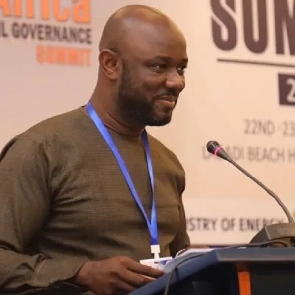The Executive Director for the Africa Centre for Energy Policy, Ben Boakye says the government has found it difficult to stop the infamous Gold for Oil policy despite its myriad of challenges as the policy only lines money in the pocket of politicians.
The International Monetary Fund (IMF) in its report has called for a review of the Gold for Oil policy as part of an ongoing updated Safeguards Assessment with the government pledging to ensure transparency in contractual volumes.
The pledge also covers areas such as pricing structures for commodity exports and imports, and intermediaries’ margins as well as a conduct of a regular performance audits of the scheme by the Auditor General.
But speaking to Starr News, Ben Boakye says despite assurances by the government the Bank of Ghana would not withdraw from the scheme, the central bank has stopped supporting the programme due to losses it has incurred that are yet to be quantified.
“Government and BOG keep saying they are still supporting the policy but the reality is that they are not.”
“Bank of Ghana started giving some money to PMMC to buy gold, they made losses early days and decided not to proceed, so they have not been giving money for PMMC to buy gold,” he alleges.
Ben Boakye adds that the policy has not been stopped because it is only pushing state money into private pockets.
“I think they [the government] are just making money for politicians and it is difficult to stop it. Politicians now have control over the downstream space much more than has ever happened and so it makes it difficult to stop.” He told Starr News.
“What we have to know is that the losses when they strike are coming at us and the people are the ones to bear it. If we are not getting tax revenue from gold export in this country, it is the state that is losing money through that space at the same people are making that money through their pocket, because that 1% tax that should come to the state, some middlemen who says they are the ones trading the gold are taking that 1.5%, so we have just found a way to push the benefits of the state into private pockets,” he concluded.
Business News of Wednesday, 7 June 2023
Source: starrfm.com.gh







![Former President Akufo-Addo [L] and Okatakyie Afrifa Mensah Former President Akufo-Addo [L] and Okatakyie Afrifa Mensah](https://cdn.ghanaweb.com/imagelib/pics/587/58758132.295.jpg)









